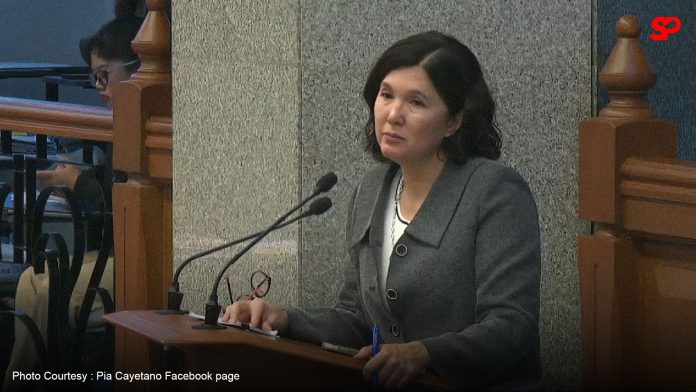MANILA – The Senate on Monday approved Senate Bill No. (SB) 2793 or the proposed Philippine Natural Gas Industry Development Act, a priority of the Legislative-Executive Development Advisory Council (LEDAC).
Fourteen voted in favor of the measure while three were against it.
Senator Pia Cayetano, who sponsored the measure, thanked her colleagues for supporting the “historic measure” which seeks to promote energy security and sustainable economic growth.
“This legislation supports our own and also international commitments to cleaner, more efficient energy production,” Cayetano said in her manifestation, assuring that the bill aligns with both national and global commitments to cleaner energy, recognizing natural gas as a transition fuel on the path to renewable energy.
“We are looking forward to seeing the benefits of this measure, not tomorrow, not at the end of the year, because energy security is a generational commitment. So, this is for the next generation. We hope we all live healthy lives to see the benefits of this measure,” she added.
Senator Raffy Tulfo, in another manifestation, highlighted the importance of energy independence for national security.
Drawing from the disruptions seen during the Russia-Ukraine war, he pointed out that relying on imports creates a false sense of security, leaving the country vulnerable to external influences.
“We are lucky that this did not heavily affect the electrification of major cities and critical facilities (in our country), but we cannot afford to risk being dependent on luck and external circumstances when it comes to ensuring that our essential services, economic infrastructure, and continuity of business operations remain unstable,” Tulfo said.
He noted that the bill includes incentives to promote private investment in indigenous natural gas development, which would foster energy independence and help prevent sudden price spikes.
Tulfo believes that the provisions of the measure would ensure that no sudden price fluctuation would occur in the market, making energy more available and affordable at the same time so that the simple Filipino household and not only big businesses would benefit.
Reservations
Senate Deputy Minority Leader Risa Hontiveros, one of three who voted “no,” expressed concern on how the bill favors indigenous natural gas.
Hontiveros warned that it may abandon the “least-cost” principle, which ensures affordable energy for Filipino consumers and instead guarantee a market for domestic natural gas, regardless of price.
She argued it would reduce competition and prevent price comparisons with international markets, potentially locking the country into more expensive energy options.
“This bill, in its current form, could perpetuate past mistakes in our energy sector. I urge my fellow senators to carefully consider these concerns as we proceed with this important legislation,” Hontiveros said.
She also criticized the bill’s lack of cross-ownership restrictions in the natural gas sector, which she believes could lead to monopolistic practices.
Hontiveros further said that prioritizing fossil fuels like natural gas could weaken renewable energy’s potential to reduce costs.
Meanwhile, Senator Sherwin Gatchalian expressed his reservations specifically in the prioritization of indigenous natural gas over conventional energy sources.
This provision, Gatchalian said, could raise electricity prices by placing natural gas at the top of the merit order, even if cheaper options are available.
He likewise criticized the lack of competitive bidding or price discovery mechanisms, which could otherwise ensure consumers pay the lowest possible price for natural gas.
Without these processes, Gatchalian said indigenous gas suppliers may have the freedom to set higher prices, subjecting consumers to price inflation and foreign exchange risks, particularly since the gas in Palawan-based Malampaya is priced in US dollars.
“This means that even if power from other conventional energy sources will have a lower bid in the wholesale electricity spot market than power from indigenous natural gas, the latter will still be prioritized. This will push up spot prices, thereby placing the burden of higher prices on consumers,” Gatchalian said.
“In addition, a mandated offtake for indigenous gas without competitive bidding or price discovery, would allow indigenous gas suppliers to set prices without restriction. Our responsibility to the Filipino people is to protect their interests and to act as guardians of consumer welfare,” he added.
Develop own resources
Cayetano, however, said that the bill promotes the use of indigenous energy sources, which she argues are beneficial for the country, the environment, and consumers.
She emphasized that, like with agricultural self-sufficiency, the country should aim to rely on its own natural resources, instead of only imports, which would help make energy more affordable.
“We take a stand and we decide that we want to develop our own indigenous sources. Renewable energy, under existing laws, already has priority,” Cayetano explained.
“Mr. President to also be very, very, clear, we have price mechanisms, we have transparency. The law is very clear about fair and open access,” she assured. (PNA)

